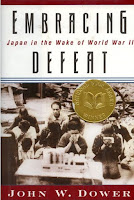In the last couple of weeks I've finished some books that haven't gotten full reviews. Here are some quick shots!
First up: New Mexico, A History. This is...exactly what it says it is, a history of New Mexico. Published to celebrate the state's 100th anniversary of being part of the union, it begins with the first known human habitation of the area and proceeds to the present day. In broad strokes: Pueblos and other tribes settle, the Spanish arrive to preach and mine, Mexico revolts, Texas invades, cattlemen and sheep-ranchers fight, rail lines bring farms and tourism, World War 2 brings a lot of military investment, Indians organize for civil rights, and the cities pursue their own individual identities: Santa Fe as the ancient and mysterious capital, Albuquerque as the progressive center of business, Las Cruces as a haven for low-income residents, and Roswell as...well, you know Roswell. If you have an interest in the state, it's an interesting book, particularly given that New Mexico is home to three cultures which have been rubbing off on one another for centuries.
Next: Embracing Defeat: Japan in the Wake of WW2. When I checked this out I thought it covered the second half of the 20th century, documenting how a war-ravaged empire became a booming democracy whose economic prowess was putting the fear of conquest into people in the 1980s. The book largely focused on the immediate postwar era, however, on the six years of American occupation in which the Japanese had to figure out what to do in the wake of their worldview being fairly destroyed. It makes for diverse reading: the author examines new literature and social behavior alongside debates over a political constitution and economic development.
Thirdly, The Heart of the Dragon is a book published in 1985 which surveys Chinese culture. In the wake of reform, China's economy was on the rise. threatening even Japan. This survey explores China's historical legacy and its growing role in the global economy. China's culture, not its politics then and now, are the feature; early chapters cover the arguments between China's biggest schools of thought (Confucianism, Daoism, and Legalism). The first two had their own differences, but both had an optimistic view of human nature at odds with Legalism -- which viewed people as so liable to mischief that only an omnipresent and unyielding mesh of rules could keep them on the straight and narrow. Although the chapters on agriculture and economics are badly dated, overall it's an attractive introduction to Chinese society through the ages.



'Embracing Defeat' popped up on my radar a while back so thanks for that review. Looks interesting......
ReplyDelete